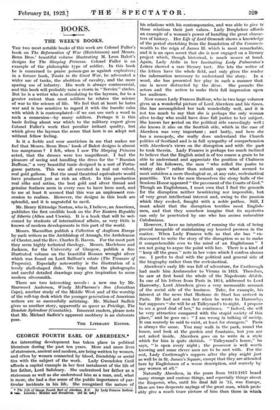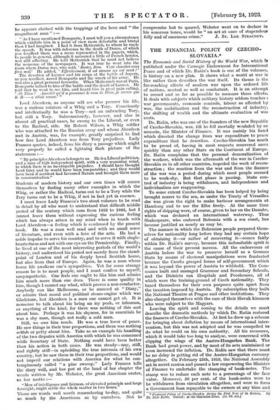GEORGE FOURTH EARL OF ABERDEEN.* Ax interesting development has taken
place in political literature during the past ten years. More and more lives of statesmen, ancient and modem, are being written by women, and often by women connected by blood, friendship or social ties with the subject of the work. Lady Gwendolen Cecil affords a capital example in her first instalment of the life of her father, Lord Salisbury. She understood her father as a statesman as well as she understood him as a man, and, what is more, she had a due sense of the public importance of par- ticular incidents in his life. She recognized the nature of • The Life of George Fourth Bari of Aberdeen. E.G. By Lady Frances Balfour.
A vela. London: Ifdddat and 8toluthtcm. 2a: net.) • • •
his relations with his contemporaries, and was able to give tc those relations their just values. Lady Burghclere afford!. an example of a woman's power of handling the great charac- ters of history, • Her Life of Lord Ornwnde shows a knowledge of the period stretching from the foundation of the Common- wealth to the reign of James II. which is most remarkable, and it is an open secret that she is now engaged on a literary project which, though historical, is much nearer at hand. Again, Lady Airlie in her fascinating Lady Palmerston's Letters showed a rare literary tact. She lets the writer of the letters have the whole field, and only gives the reader the information necessary to understand the story. In a word, she has presented her play in such a manner that one is never distracted by the decor. She permits the actors and the action to make their full impression upon her audience.
Now comes Lady Frances Balfour, who in two large volumes gives us a wonderful picture of Lord Aberdeen and his times. She has accomplished her task wonderfully well, and it is not too much to say that she is perhaps the only woman alive to-day who could have done full justice to her subject. She know§ her period on the political side exceedingly well ; she knows it also on the Scottish side, which in the case of Aberdeen was very important ; and lastly, and here she has a monopoly, she really does understand the Church polities of Scotland and is in full sympathy of comprehension with Aberdeen's views on the disruption and with the part he took therein. Lady Frances is perhaps too much inclined to believe that the English mind is of too coarse a grain to be able to understand and appreciate the position of Chalmers and of his followers, the men " who rolled the psalm to wintry skies " rather than submit upon what seemed to most outsiders a mere theological or, at any rate, ecclesiastical punctilio. Yet to the men themselves the stony halls of the Sessions House appeared " the pavement of the Courts of God." Though an Englishman, I must own that I find the grounds for the disruption neither bewildering nor impossible, but of very great intellectual interest and, owing to the passion which they evoked, fraught with a noble pathos. Still, I must admit that the disruption terrifies most English- men, and that they somehow imagine that its mysteries can only be penetrated by one who has anima naturaliter Caledoniana.
However, I have no intention of running the risk of being proved incapable of maintaining my boasted prowess in the matter. When Lady Frances tells us that she has " en- deavoured to write the story of the disruption so as to make it comprehensible even to the mind of an Englishman " I am not going to argue the point with her. There is a kind of " keep off the grass " note in her voice which I confess alarms me. I prefer to deal with the political and general side of the biography rather than the ecclesiastical.
Aberdeen's early life was full of adventure, for Castlereagh had made him Ambassador to Vienna in 1818. Therefore, he saw at first hand the whole of the Napoleonic debdcle. In one of his letters from Paris in 1814, addressed to Lord Harrowby, Lord Aberdeen gives a very memorable account of the social side of the business. Take, for example, his interest at the news that Madame de Stael has arrived in Paris. He had not seen her when he wrote to Harrowby, but supposes " she will be at Talleyrand's to-night. I propose to see a good deal of her," he continues. " Indeed, she will be very attractive compared with the stupid society of this place," and he goes on : " I am wrong in talking of society. It can scarcely be said to exist, at least for strangers." Paris is always the same. You may walk in the park, round the house, and look at the garden and fountains, but you are not asked inside. Aberdeen goes on to write in a style
which for him is quite skittish. " Talleyrand's house," he says, " is open every night ; the possessor is well worth knowing and some clever men are to be met with. For the rest, Lady Castlereagh's suppers after the play might just as well be in St. James's Square, except that they are attended here by Englishmen of a worse description, and scarcely by any women at all." Naturally Aberdeen, in the years from 1818-1815 heard many strange and curious things, and especially things about
the Emperor, who, until his final fall in '15, was Europe, Here are two desperate sayings of the great man, which prob- ably give a much truer picture of him than those in which
he appears clothed with the trappings of the hero and " the magnificent man " :—
1 " As I have mentioned Bonaparte. I must tell you a circumstance which exhibits him in a point of view more detestable and brutal than I had imagined. I had it from Metternich, to whom he made the speech. It was with reference to the death of Duroc, of which you recollect there was a scene represented in the papers, whiph, to people in general, although it savoured a little of French heroics, was still affecting. He told Metternich that he must not believe the nonsense of the newspapers. ft was true he went into the room where Duroc was, who said, Sortez, Sire. Celle chambre vows fera mal.' He added, Effectivenieni, it eel comme un rat mort ' The devotion pf Lannes and his corps at the battle of Aspern, as you recollect, saved Bonaparte and the wreck of his army. He was also a great personal favourite. When Metternich was at Paris, Bonaparte talked to him of the battle and the death of Lannes. He said that he went to sec him, and heard him in great pain calling, .21h Dieu I Aussitol qu'il a prononce le nom de Dieu, 3e savois que le B----e alloit crever.' " Lord Aberdeen, as anyone will see who peruses his life, was a curious mixture of a Whig and a Tory. Consciously and intellectually he was a Tory—not an unbending Tory, but still a Tory. Subconsciously, however, and also in almost all practical cases, he swung to the Liberal, or even to the Radical, side. Sir Robert Wilson, a Whig soldier who was attached to the Russian army and whom Aberdeen met in Austria, was, for example, greatly surprised to find how free Lord Aberdeen was from Tory prejudices. Lady Frances quotes, indeed, from his diary a passage which might very properly be called a lightning flash picture of the statesman :- " By principles Aberdeen belongs to us. He is a Liberal politician, and a man of high independent spirit, with a very reasoning mind, in which there is no inextirpable prejudice. I should have thought Lord Grey and he would have been inseparables ; and they would have been if accident had favoured Nature and brought them more In communication."
Students of modem history and our own times will amuse themselves by finding many other examples in which the Whig, or rather the Radical, turns out to be a Tory while the Tory turns out to be a Whig, if not in fact yet in essence.
I must leave Lady Frances's two stout volumes to be read In detail by all who want to understand that difficult middle period of the century which runs from 1833 to 1866, but I cannot leave them without expressing the curious feeling which has always arisen in my mind when in touch with Lord Aberdeen—a feeling which is confirmed by the present book. He was a man well read and with no small sense of literature, and even with a loire of the arts. He had a noble impulse to serve his country, and to serve it with single- heartedness and not with one eye on the Premiership. Finally, he lived at one of the most interesting periods of the world's history, and understood his period not merely from the stand- point of London and of his deeply loved Scottish home, but also from that of Europe. Again, he was a man whose home life awakens one's sympathies. Yet for some strange reason he is to most people, and I must confess to myself, unsympathetic. One feels one ought to like him and admire him much more than one does. There is some quality in him, though I cannot say what, which proves a non-conductor.
Anybody can like Melbourne, or be amused at " Dizzy," or admire that moral and political steam-engine which was Gladstone, but Aberdeen is a man one cannot get at. It is nonsense to talk about his being an icy peak, or inhuman, or anything of the kind, for there was nothing of this sort about him. Perhaps it was his shyness, for in essentials he was a shy man, though not really a cold man Still, we owe him much. He was a true lover of peace. He saw things in their true proportions, and there was nothing selfish or petty about him. Take as an example his handling of the two disputes with America with which he was concerned while Secretary of State. Nothing could have been better than his action in both cases. He was steady—nay, stiff, and rightly stiff—in upholding the true interests of his own country, but he saw them in their true proportions, and would not imperil our relations with America for what he con- temptuously called " a pine swamp." Lady Frances tells the story well, and has put at the head of her chapter the words written by Mr. Webster, the great American orator, as her motto :- " Men of intelligence and fairness, of elevated principle and large foresight, might settle the whole matter in two hours.
Those are words well worth remembering to-day, and quite as much by the Americans as by ourselves. Not to compromise but to quarrel, Webster went on to declare in his sonorous tones, would be " an act at once of stupendous











































 Previous page
Previous page